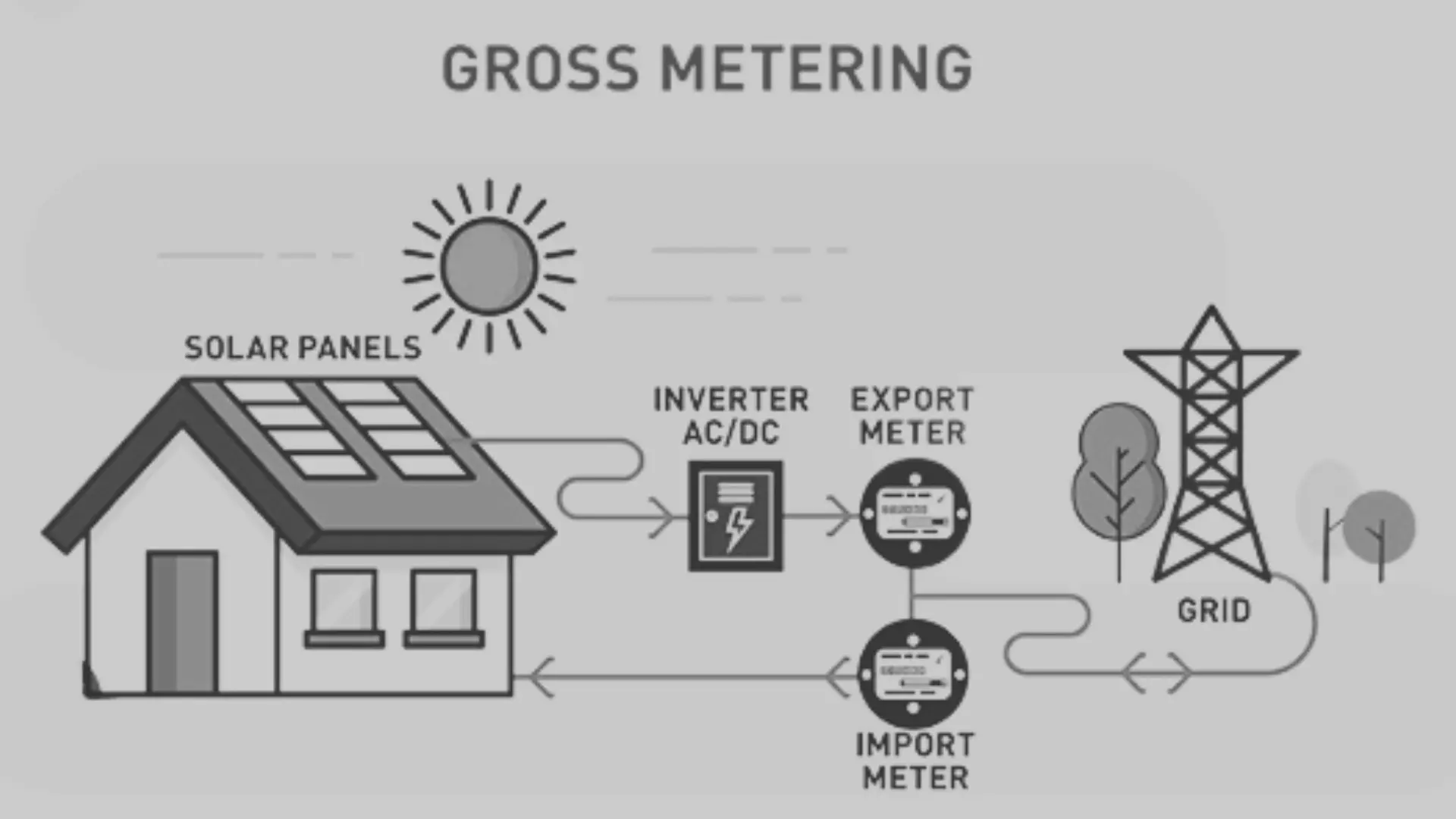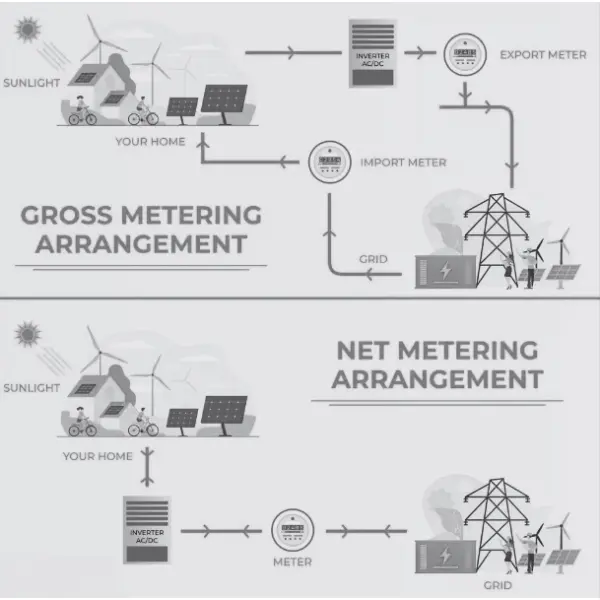Gross Metering: The Game-Changer in Energy Management
In recent news, widespread reports have indicated that net metering is being phased out. Although the government has not officially announced this change, the media speculates about it. As we await official confirmation, let’s dive into gross metering and how it compares to net metering.
Gross metering efficiently manages solar energy by measuring all the power your solar panels generate before it’s used or sent to the grid. This system ensures accurate billing and maximizes the benefits of solar energy production. Due to this, you can better track your energy output and make smarter decisions about energy consumption. Switch to gross- metering today and take complete control of your solar savings!

What is Gross Metering?
Under the gross-metering system, electricity produced by consumers’ rooftop solar panels is supplied directly to the national grid. Subsequently, these consumers purchase their generated electricity from the distribution company, which may lessen their overall financial savings. Here’s a simple breakdown:
Generation Measurement
A bidirectional meter is installed between your solar system and your home. This meter measures all the electricity your system generates.
Utility Control
All the electricity produced is fed into the grid, not directly used by your home.
Billing
You are compensated for the electricity sent to the grid at a predetermined rate, which might be lower than the rate at which you buy electricity from the utility.
What is Net Metering?
Net metering is a billing mechanism that allows homeowners with solar panels to sell the excess electricity they generate back to the grid. Here’s a simple breakdown:
Generation
Suppose you have a 10kW solar power system on your roof. During the day, depending on the sunlight, it might generate anywhere from 5kW to 10kW.
Usage
The electricity generated is first used to power your home. If your home requires 2kW at a given moment and your system generates 5kW, the surplus 3kW is fed back into the grid.
Billing
Traditionally, under net metering, the utility company buys this surplus electricity at the same rate it charges you, effectively lowering your electricity bill.
Gross Metering vs. Net Metering: What’s Best for Your Solar Panel System?
Gross-Metering
All generated electricity is sent to the grid, and you buy back the electricity you use, which may not result in as much savings.
Net Metering
You directly use the electricity you generate, reducing your reliance on the grid and lowering your electricity bill.
1. Energy Consumption Tracking
Gross-Metering
Under gross-metering, all electricity generated by a solar system is sent directly to the national grid. Consumers purchase their total electricity needs from the grid separately. Essentially, production and consumption are measured independently.
Net Metering
In contrast, net metering allows consumers to offset their electricity consumption with the energy they produce. Any excess generation is sent to the grid, and the consumer is credited, reducing the overall bill.
2. Financial Impact
Gross-Metering
Consumers may see reduced financial benefits because they must buy back the electricity at retail rates, which can be higher than the price they receive for the energy they produce.
Net Metering
This system often provides more financial benefits, as consumers can directly reduce their electricity bills by using the power they generate. Excess energy sent to the grid earns credits, further lowering costs.
3. Tariff Rates
Gross-Metering
Typically, the tariff for electricity sold to the grid by consumers is lower than that for electricity purchased from the grid, impacting savings.
Net Metering
Consumers are effectively compensated at the same rate they pay for electricity from the grid, making it a more attractive option for maximizing savings.
4. Energy Efficiency Incentives
Gross-Metering
There is less direct incentive for consumers to reduce their energy consumption or use the solar power generated efficiently, as all generated power is sent to the grid regardless.
Net Metering
Encourages efficient energy use and self-consumption, as consumers directly benefit from using their solar power. This could lead to potentially lower energy bills and more mindful energy usage.
5. System Complexity and Implementation
Gross-Metering
This system is more straightforward to implement as it involves separate measurements of generated and consumed electricity. However, it can be less popular due to reduced financial incentives.
Net Metering
Timers are often more complex to administer due to the need for accurate tracking and crediting of surplus energy. Despite this, complex consumers generally prefer timers for their favorable financial returns.
By understanding these differences, consumers can make more informed decisions about which metering system aligns best with their energy needs and financial goals.

Metering Setup
Net Metering
When you feed electricity into the grid, one meter runs backwards.
Gross-Metering
Two meters measure the total generation, and one measure the electricity consumed from the grid.
Financial Impact
Net Metering
Potentially higher savings as you offset your consumption with your generation.
Gross-Metering
It reduced savings due to the lower rate paid for your generated electricity than the buying rate.
Implications for Solar Consumers
If gross-metering is implemented, solar consumers will face several challenges:
Reduced Savings
The primary appeal of solar power—significant savings on electricity bills—will diminish. Consumers will receive lower compensation for their solar-generated electricity while paying standard rates for their consumption.
Investment Concerns
The attractiveness of investing in solar energy systems will decrease, potentially slowing down the adoption of renewable energy.
Dependence on Grid
Although previously self-sufficient in their energy production, they will once again become dependent on the national grid, reducing solar energy’s independence.
Future Prospects
The net-to-gross metering change reflects broader trends in energy policy and grid management. As the energy landscape evolves, staying informed and adapting to new systems will be crucial for maximizing solar energy’s benefits.
If you’re considering solar power, it might be wise to explore hybrid systems that can store energy during non-sunny periods. This process could help mitigate some of the financial drawbacks of gross-metering.
Conclusion
The transition from net to gross-metering marks a significant shift in how solar energy is managed and monetized. Understanding these changes and adjusting your solar strategy can help maximize your investment. While it might address some immediate government financial concerns, it risks undermining the progress made in renewable energy adoption.
The government must carefully balance short-term financial stability with long-term sustainability and the benefits of a decentralized, renewable energy system. As stakeholders continue discussions, the hope is for a policy supporting solar energy growth, ensuring affordable and sustainable electricity for all.
FAQs
